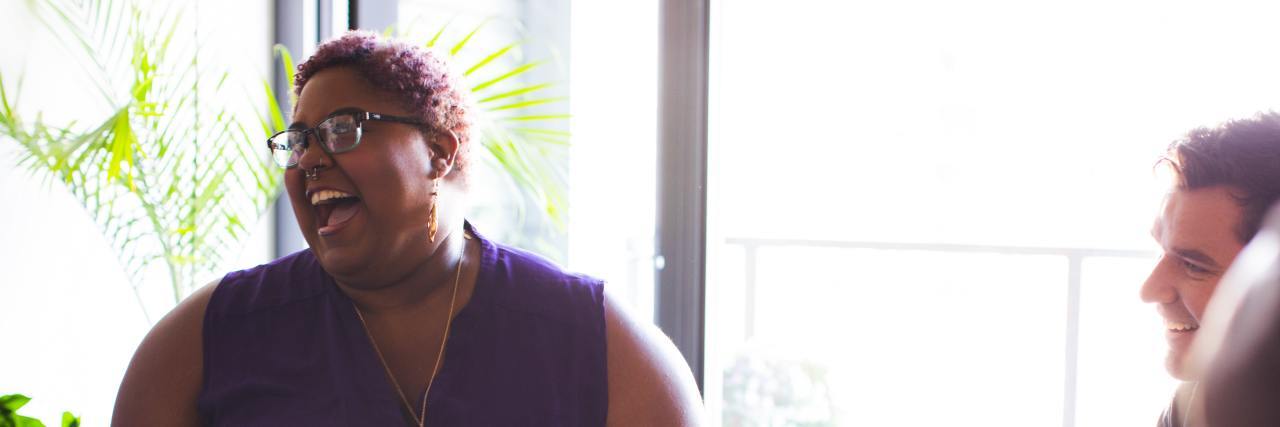The body positive movement began as a social justice movement, part of the fat activism movement. I started writing about these issues in 2009 and I’m just one in a long line of people (that starts before I was born) who have been fighting not just to have the freedom to love our bodies, but to be liberated from cultural weight stigma. So, how did body positivity become something that predominantly centers (and profits) thin, white women in their own personal journeys of body love?
The issues with the centering of whiteness, and not giving credit to people of color for their contributions and leadership, have been present since the beginning of body positivity. But, the centering of thinness has happened over time, courtesy of thin privilege. That is how a thin woman learning to love the stomach roll that appears when she sits a certain way becomes something to be celebrated (and followed and paid) as a victory of “body positivity,” while a fat woman demanding that she receive ethical evidence-based healthcare in a chair that she can fit in becomes a cautionary tale of “glorifying ob*sity.”
I wrote about the issues with this type of thin-centric body positivity here. What I want to talk about today is why it needs to return to being a movement that prioritizes fat people’s liberation over thin people’s insecurities.
It’s absolutely true that a fatphobic society (and a beauty ideal based on thin, white, cis, abled bodies) affects people of all sizes, including our relationships with food, movement and our bodies. The negative feelings that thinner people have about their bodies (often driven by the fear of being/becoming fat) due to fatphobia are real, as is the personal work they have to do in order to deal with the consequences.
However, it’s not true that it affects us in the same way (as in “skinny shaming is just as bad as fat shaming.”) While all of us may be dealing with the ways in which a fatphobic society affects our feelings about ourselves, only some of us are also dealing with structural oppression based on our body size– the ways in which a fatphobic society negatively impacts fat people’s everyday lives (with the fattest people and those with multiple marginalizations experiencing the greatest oppression.)
A thin woman may have serious body image issues, but she’s not going to deal with entire restaurants that don’t have a chair that is big enough for her, airlines attempting to charge her twice as much for the same service or harmful (sometimes lethal) medical weight stigma. These are issues that fat people do experience, and no amount of loving our bodies can solve them. That’s why body positivity needs to be a movement about fat liberation– until the world views our bodies as positive we will never have equality, no matter how much we love our bodies.
Body positivity that centers thin people overcoming their insecurities actually makes the world worse for fat people. Re-casting the “problematic” body as the one that doesn’t quite meet an impossible beauty ideal (rather than one which experiences oppression and inequality at nearly every turn) further others fatter bodies. And the thin people who are centered can (and often do) choose to be “body image warriors” only in so much as their personal needs are met, keeping their fatphobic views for all of those fatter than themselves. And, all-too-often, voicing them from the huge platforms that this thin-washed body positivity has afforded them. Then, when they’re called out on it by fat people, they depend on fatphobia (and its enforcers) to privilege their position and point of view by quashing the dissent.
However, there is good news. Solving the issue of weight stigma for the fattest people solves it for everyone. Once we have true body positivity, when society accepts and affirms the full diversity of body sizes, the issues of fatphobia that harm thin people will be gone. When society realizes that there is nothing wrong with being fat, then it naturally follows that there is nothing wrong with having a little fat roll when you bring your knees to your chest.
When our culture accepts that being fat isn’t something to be feared, then thin people no longer have to spend their time, energy and money (and harm their relationships with food, movement, and their bodies) in an attempt to avoid being fat. Fighting for a world that accommodates the fattest people helps everyone be accommodated.
Eliminating weight stigma liberates people of all sizes, and that’s why body positivity must return to its roots as a social justice movement that centers the liberation of fat people, including those who live at the intersections of fat and other marginalizations, and those in the fattest bodies. For everyone’s sake.
So what can be done? Well, those with more thin (and other) privilege can talk about their own journeys within the context of the larger issue. They can work to dismantle weight stigma (including using their privilege wherever possible) and they can center the voices of fat people and, in particular, fat people who live with multiple marginalized intersections. It might look like, “Because of cultural fatphobia I even had a difficult time loving my relatively thin body. Here’s my journey, but understand that these issues hit those who are larger than I am much harder, including through structural oppression that people my size don’t experience. We all need to be committed to fat liberation– here are some resources to learn more/here are some fat activists to follow…”
Privileged people can never liberate those who are more oppressed by centering themselves in the discussion, so do your own work to dismantle your internalized fatphobia and act in solidarity with fat activists to dismantle cultural weight stigma.
Photo by AllGo – An App For Plus Size People on Unsplash

